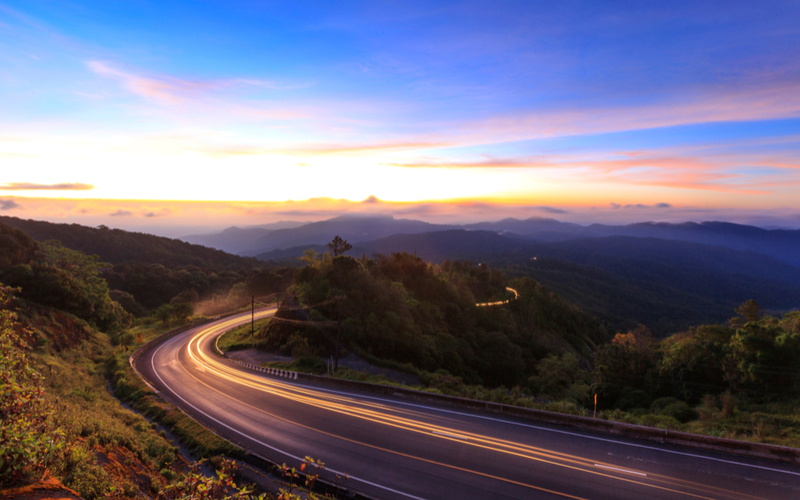We Can Build the Roads, and Other Things Too
The usual story, in textbooks at least, is that the government provides “public goods,” or goods markets are bad at providing. The standard definition of public goods has two parts:
1. Non-rival consumption. This means that if any is made, all enjoy that amount. More simply, my use of the public good does not diminish, or even affect, the amount available for everyone else.
2. Non-excludable production. This means that it is very difficult to prevent everyone from enjoying the public good, if it’s available to everyone.
The first means that there are extremely high levels of “fixed costs” in public goods. If we have enough tanks and troops to protect one person in every state of the U.S., that same army could protect millions in every state. Alternatively, you could think of this as an “externality”: If we pay to protect one person in every state, all the other people in the state are also covered under the positive externalities of defense.
And that’s why the second condition is such a problem. It’s very difficult to withhold defense if someone refuses to pay their taxes. But that means it’s hard to collect a voluntary payment; public goods are usually financed by taxes, or funds collected involuntarily, at gunpoint.
Since the only way to finance the state is coercion, using the actual threat of violence, you might think that we’d want to be careful to limit the things the state does. But it seems like almost the opposite is true: the “size” of states, both in absolute terms and as a percentage of GDP, has been growing for nearly a century, in almost all developed nations.
The Road to Serfdom?
In 1944, F.A. Hayek famously issued a warning about the expansion of the state. It’s not just public goods, but “planning” generally that expands the scope of state control. It may start with the “management” of just a few sectors, with some subsidies to encourage investment and maybe some price controls for “fairness.” But these distortions of price signals quickly metastasize, as the sectors they represent cause malinvestment in economically “adjacent” sectors. Hayek’s point was that there is an inherent tendency in state action to grow larger, and to control more of the economy, precisely because the distortionary effects of state action in areas that could be managed by markets are dynamically expansive.
As I said at the outset, the usual story is that the state should provide public goods, because the market can’t. But that’s not actually how we choose the boundary between state and private action. We choose using collective choice, usually some form of voting. The problem is obvious: voters are likely to act on their own selfish interests, or ideologies. Voters have no particular expertise in deciding whether something is a public good. Voters’ main interest may simply be whether they can get the thing for “free.”
For example, the recent push by some politicians for “free tuition” is in fact nothing of the kind. College will still be very expensive, and that cost will still be paid. All “free” tuition means is that students won’t have to pay, and taxpayers will be saddled with the bill.
Is college a “public good”? The very fact that tuition can be charged is proof the answer is no; further, it is not even true that a college class is non-rival; the size of a class quickly becomes large enough that adding more people reduces the value of being in that classroom. This kind of good, with only local non-rivalness and easy excludability, is called a “club good,” one of the theoretical contributions of Nobel Prize-winning economist James Buchanan.
Non-profit organizations, or for that matter for-profit organizations, can do the job just fine. The desire for free tuition is simply an example of Hayek’s wise prediction that state interference expands: state subsidies of tuition have driven prices up, so now there is a political demand for even more state meddling, in the form of free tuition. The real answer is to let private, voluntary action take over.
Interestingly, this same logic has been worked out over and over for another classic “public good that isn’t”: roads. Most people take it for granted that the state will “provide” roads; state provision usually means three things:
1. The activity will be financed by tax money, taken from a general fund.
2. The activity will be operated by state employees, paid by tax money.
3. The price for enjoying or using the activity is zero.
These things could be mixed and matched, but for a classic public good all three are usually present. What about roads? Typically, in the U.S. at least, roads are financed by tax dollars, and are operated by the state’s Department of Transportation. The actual construction is often done by contractors, paid by the state but employed by a private firm. And the “price” of using the road is built into a tax on fuel. At one time such a tax was close to being a user fee, since someone who drove more or who drove a heavier vehicle used more fuel and therefore paid more taxes. Nowadays, when there are electric cars that pay no taxes and the problem of road use is congestion more than damage to the road itself, this tax/fee structure is archaic.
Still, what are you going to do? We all know that roads are public goods, right? And that all sensible nations provide roads through the state.
Except… no. Pretty much none of that is true. Roads are not public goods, not even close. Congested roads are rivals in consumption, because if my car is on a piece of road yours can’t be. And roads are excludable, because with GPS technology and inexpensive payment transponders such as E-Z Pass the owners or operators of a road can use detailed pricing that accounts for time, congestion, and weight of the vehicle. Fines or charges can be easily automated using cameras and computerized billing.
So, why is it all countries treat roads as public goods? The short answer is that they don’t. In fact, in many developed nations both the tradition and the trend is toward more decentralized solutions. The “Nordic nations,” which many people think of as being socialist, have long relied on local solutions wherever it is possible. The mistake people often make is to equate “cooperative” activity with “state provision,” but club-good solutions, with small groups organizing and funding roads, is actually the normal solution in Scandinavia.
A recent report from the Devoe L. Moore Center gives this description:
Two-thirds of roads in Sweden are privately operated and managed by local Private Road Associations (PRAs). These road associations are composed of homeowners who live along private roads. An estimated 140,000 kilometers (about 87,000 miles) of roads are the responsibility of 60,000 PRAs…. The costs of upkeep are divided among members of the association. PRAs that do not accept government subsidies can prohibit traffic at their discretion. Those that receive subsidies must allow all vehicles to travel on their roads.
Private ownership by PRAs has proven to be a cost-effective measure for operating roads according to the the Swedish government. In 2001, a government-commissioned evaluation found PRAs could run their roads at about half the cost as for the national.
Finland employs a similar system. Many private roads are managed by local cooperatives. Finland has 78,000 kilometers (about 48,500 miles) of public roads and 280,000 kilometers (about 174,000 miles) of private roads. Of the 5 million people who live in Finland, around 700,000 of them reside near a private road. Like Swedish PRAs, Finnish cooperatives are made up of homeowners who live proximate to private roads. These homeowners collectively maintain their local roads and are eligible to receive subsidies from the federal government to cover a portion of their expenses.
There are two lessons here, and both are important.
First, many of the things we expect from the state are not public goods. They could be more efficiently and effectively handled by other kinds of cooperation.
Second, roads in particular are emphatically not public goods, and many other nations have solved the problems of road use and financing by decentralizing provision and control. For some reason, the U.S. has allowed itself to become a socialized road system, with no sense of any local ability to improve roads, fix potholes, or cooperate with your neighbors. With available technology, and with the even better technology now being developed, roads can be operated locally and voluntarily. And that’s actually true for many activities we now simply assume are restricted to the state. Some creative rethinking can put us on the road to a better tomorrow.










